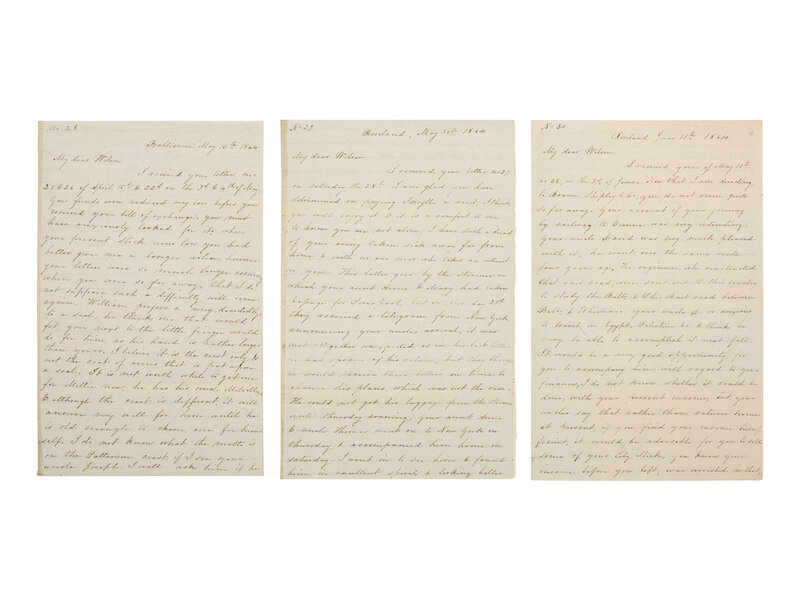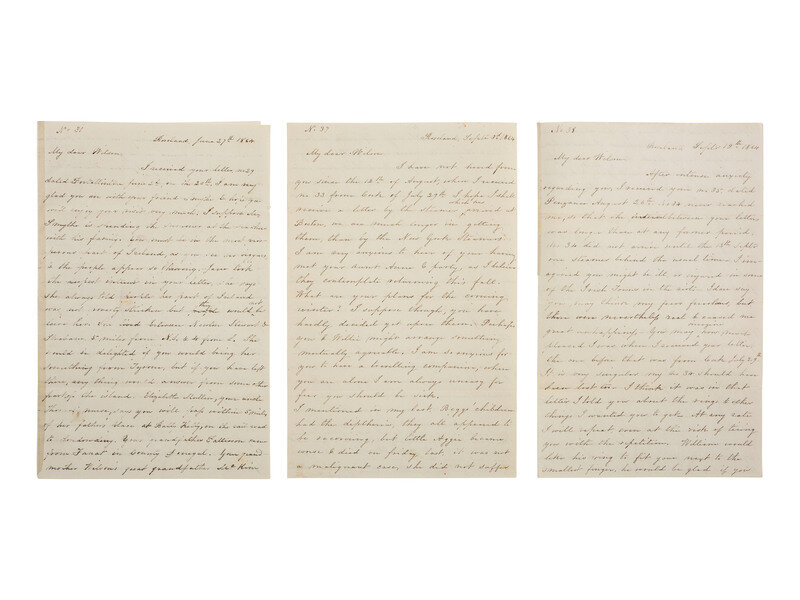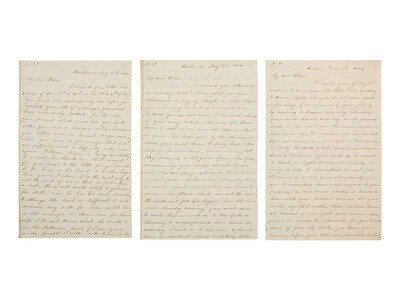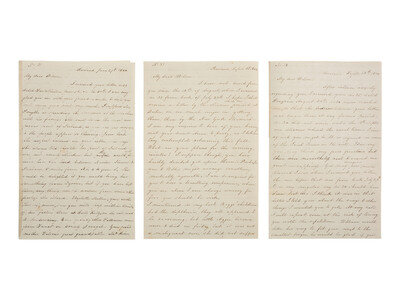[CIVIL WAR]. Group of 6 letters from Confederate sympathizer Mary Wilson Patterson (1810-1884) of Baltimore, Maryland, describing the ongoing war to her son who was traveling through Europe.
Sale 2057 - American Historical Ephemera and Photography
Oct 25, 2024
10:00AM ET
Live / Cincinnati
Own a similar item?
Estimate
$500 -
700
Price Realized
$318
Sold prices are inclusive of Buyer’s Premium
Lot Description
[CIVIL WAR]. Group of 6 letters from Confederate sympathizer Mary Wilson Patterson (1810-1884) of Baltimore, Maryland, describing the ongoing war to her son who was traveling through Europe.
PATTERSON, Mary Louisa Wilson. Group of six autograph letters signed ("M.L.P."; "Mary L. Patterson"; "Your Affectionate Mother"), to her son, ("My dear Wilson") James Wilson Patterson (1842-1908), while he was traveling throughout Europe. These letters were numbered by Mary Patterson, being 28, 29, 30, 31, 37, 38 in the series. Various places, incl. "Baltimore" and "Roseland" the family's rural Maryland estate. 6 May 1864 - 19 September 1864. Each letter approx. 4pp, 5 1/4 x 8 1/4 in. Accompanied by a typed transcription for each letter.
Mary Patterson's letters to her son are lengthy and detailed. While most of the correspondence deals with family news, discussion of his travels and finances, and other matters, Mary does write regularly about the status of the war. On 16 May she discusses the mounting losses on both sides due to battles of General Grant's Overland Campaign. She expresses hope that J.E.B. Stuart has not been killed, and notes that a Sanitary Fair just closed in Baltimore. "It was crowded by not by Southern sympathizers though they said southern prisoners were to share in the benefits, some thought they would only get the leavings." Having removed from Baltimore to their country estate at "Roseland," Mary writes two weeks later, noting that she is glad James is away at present, likely because it immunes him from serving during the war. "Bradford [Maryland governor] has called for two regiments of militia volunteers, not to be sent out of the state, but he says if they will not come forward voluntarily, he will call for a draft from 18 to 45 years & these shall go wherever he chooses to send them & shall not be allowed to furnish substitutes or to pay commutation money." Regarding slavery, Mary writes on 27 June that "All the slaves have gone from Springfield except John Shadow, his wife and children - The convention for the state of Maryland have abolished slavery except for crime, the people will have to vote on it, but that will be a merely nominal thing, as no one will be allowed to vote, I suppose, except those that go with the powers that be." The remaining letters discuss the upcoming election and candidates Lincoln and McClellan, Union troops in Baltimore, a potential draft, prices for food and other goods, and more.
Mary Louisa Patterson was the wife of Henry Patterson (1800-1858), a son of the powerful Maryland businessmen William Patterson (1752-1835). William Patterson was a gun-runner during the American Revolution, a founder of the Baltimore and Ohio Railroad, the first president of the Bank of Maryland, and founder of the Canton Company. He was also an enslaver who owned several plantations and country estates in the Baltimore area, along with an extensive amount of land in the city of Baltimore. William's son Henry would likely have inherited a portion of his father's vast wealth, and he himself was a successful Baltimore merchant, indicating that his wife Mary and their son James would have enjoyed a life of relative wealth and privilege as evidenced in these letters. Though the US 1850 Slave Schedule does not indicate that Henry Patterson enslaved any African Americans, the letters indicate that the family nonetheless maintained sympathies towards slaveholding families and the southern cause.
This lot is located in Cincinnati.
Condition Report
Auction Specialist



